商务英语翻译国内外研究的综述
- 格式:doc
- 大小:23.50 KB
- 文档页数:3
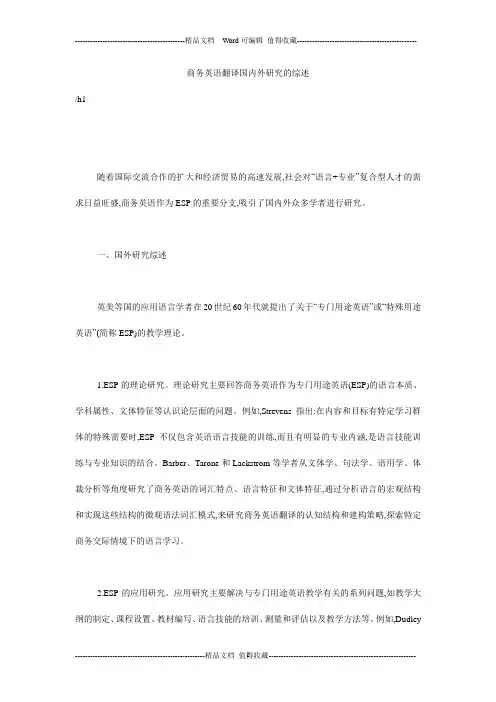
商务英语翻译国内外研究的综述/h1随着国际交流合作的扩大和经济贸易的高速发展,社会对“语言+专业”复合型人才的需求日益旺盛,商务英语作为ESP的重要分支,吸引了国内外众多学者进行研究。
一、国外研究综述英美等国的应用语言学者在20世纪60年代就提出了关于“专门用途英语”或“特殊用途英语”(简称ESP)的教学理论。
1.ESP的理论研究。
理论研究主要回答商务英语作为专门用途英语(ESP)的语言本质、学科属性、文体特征等认识论层面的问题。
例如,Strevens指出:在内容和目标有特定学习群体的特殊需要时,ESP不仅包含英语语言技能的训练,而且有明显的专业内涵,是语言技能训练与专业知识的结合。
Barber、Tarone和Lackstrom等学者从文体学、句法学、语用学、体裁分析等角度研究了商务英语的词汇特点、语言特征和文体特征,通过分析语言的宏观结构和实现这些结构的微观语法词汇模式,来研究商务英语翻译的认知结构和建构策略,探索特定商务交际情境下的语言学习。
2.ESP的应用研究。
应用研究主要解决与专门用途英语教学有关的系列问题,如教学大纲的制定、课程设置、教材编写、语言技能的培训、测量和评估以及教学方法等。
例如,Dudley主张在专门用途英语教学中以任务为主,以应用为核心的教学途径,即“为用而学,用中学,学中用”。
它为学生提供了较大的实践空间,能较好地发挥学生的主动性和创造性。
Douglas指出,特殊目的语言能力由语言知识(语法知识、语篇知识、功能知识和社会语言学知识),策略能力和背景知识(话语领域)构成,因此商务英语翻译能力的培养应从语言知识、策略能力和商务背景知识三方面着手。
二、国内研究综述国内商务英语翻译教学研究从2010年起开始蓬勃发展,并逐渐呈现上升趋势。
具体研究现状如下:1.研究主题类型。
商务英语翻译教学研究大体分为五类,一是进行理论剖析,即分析语言学理论尤其是翻译学理论对商务英语翻译教学的指导意义,如建构主义、功能目的理论等指导下的商务英语翻译教学;二是研究教学模式,即探讨当今流行的一些教学模式或教学方法在商务英语翻译课堂中的运用,如任务型教学法、项目教学法、小组合作法、案例分析法等;三是研究现状、提出对策,即描述当前商务英语翻译教学的现状(如学生基础较差、教材陈旧、师资力量不足等),并提出相应的解决对策;四是研究翻译实训教学,即关注校企合作,面向市场或区域经济的商务英语翻译教学;五是关注网络多媒体和语料库在商务英语翻译教学中的运用。
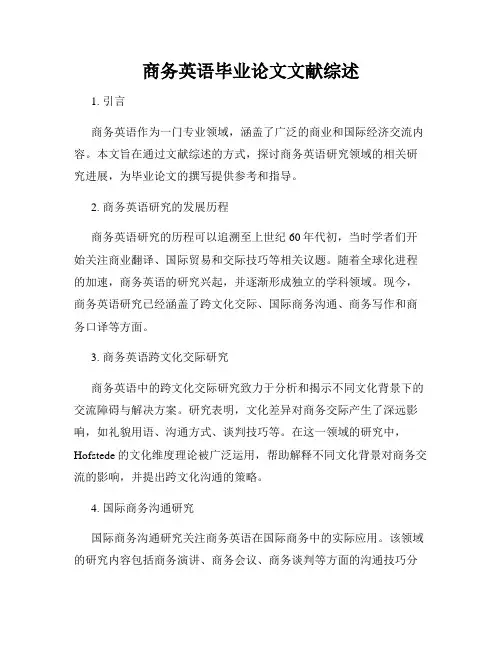
商务英语毕业论文文献综述1. 引言商务英语作为一门专业领域,涵盖了广泛的商业和国际经济交流内容。
本文旨在通过文献综述的方式,探讨商务英语研究领域的相关研究进展,为毕业论文的撰写提供参考和指导。
2. 商务英语研究的发展历程商务英语研究的历程可以追溯至上世纪60年代初,当时学者们开始关注商业翻译、国际贸易和交际技巧等相关议题。
随着全球化进程的加速,商务英语的研究兴起,并逐渐形成独立的学科领域。
现今,商务英语研究已经涵盖了跨文化交际、国际商务沟通、商务写作和商务口译等方面。
3. 商务英语跨文化交际研究商务英语中的跨文化交际研究致力于分析和揭示不同文化背景下的交流障碍与解决方案。
研究表明,文化差异对商务交际产生了深远影响,如礼貌用语、沟通方式、谈判技巧等。
在这一领域的研究中,Hofstede的文化维度理论被广泛运用,帮助解释不同文化背景对商务交流的影响,并提出跨文化沟通的策略。
4. 国际商务沟通研究国际商务沟通研究关注商务英语在国际商务中的实际应用。
该领域的研究内容包括商务演讲、商务会议、商务谈判等方面的沟通技巧分析。
研究表明,有效的商务沟通对于国际商务的成功至关重要。
因此,学者们提出了一系列的沟通策略和实践指南,以帮助商务人士提高其商务沟通的能力。
5. 商务英语写作研究商务英语写作是商务交流中重要的一环。
商务英语写作研究关注商务文档、商务报告、商务邮件等的写作技巧和标准。
这一领域的研究内容包括语言风格、篇章结构、语法规范等。
学者们通过对商务英语写作规范的研究,帮助商务人士提高其写作能力,并促进了商务文档的多样化与国际标准化。
6. 商务英语口译研究商务英语口译在国际商务交流中发挥着重要作用。
商务英语口译研究致力于分析商务英语口译过程中的问题和技巧,并提出有效的解决方案。
研究内容包括口译理论、品质控制、口译技巧等。
学者们通过对商务英语口译的深入研究,提出了一系列的实用建议和指导,以提高商务人士在国际商务交流中的口译能力。
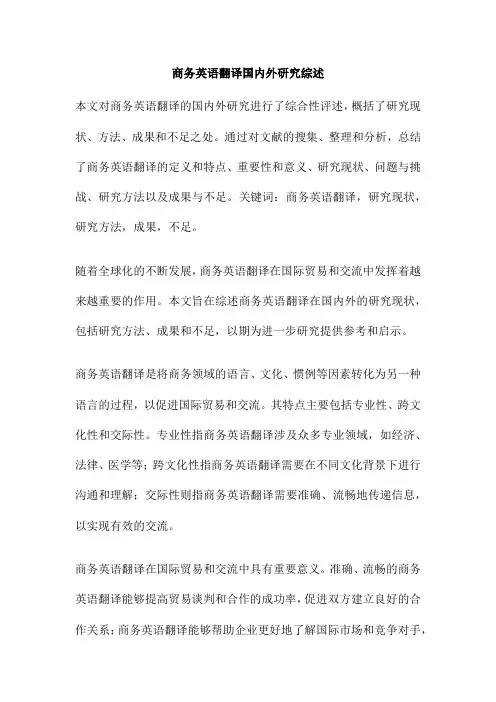
商务英语翻译国内外研究综述本文对商务英语翻译的国内外研究进行了综合性评述,概括了研究现状、方法、成果和不足之处。
通过对文献的搜集、整理和分析,总结了商务英语翻译的定义和特点、重要性和意义、研究现状、问题与挑战、研究方法以及成果与不足。
关键词:商务英语翻译,研究现状,研究方法,成果,不足。
随着全球化的不断发展,商务英语翻译在国际贸易和交流中发挥着越来越重要的作用。
本文旨在综述商务英语翻译在国内外的研究现状,包括研究方法、成果和不足,以期为进一步研究提供参考和启示。
商务英语翻译是将商务领域的语言、文化、惯例等因素转化为另一种语言的过程,以促进国际贸易和交流。
其特点主要包括专业性、跨文化性和交际性。
专业性指商务英语翻译涉及众多专业领域,如经济、法律、医学等;跨文化性指商务英语翻译需要在不同文化背景下进行沟通和理解;交际性则指商务英语翻译需要准确、流畅地传递信息,以实现有效的交流。
商务英语翻译在国际贸易和交流中具有重要意义。
准确、流畅的商务英语翻译能够提高贸易谈判和合作的成功率,促进双方建立良好的合作关系;商务英语翻译能够帮助企业更好地了解国际市场和竞争对手,为其制定正确的商业策略提供有力支持;商务英语翻译可以推动文化的传播和理解,增进不同国家之间的友谊和互信。
近年来,商务英语翻译研究得到了广泛。
国内外学者从不同角度对其进行了深入探讨,主要包括翻译理论、技巧与实践,跨文化交际,语用学等方面。
同时,随着技术的不断发展,计算语言学和人工智能在商务英语翻译领域的应用也逐渐成为研究热点。
尽管商务英语翻译研究取得了一定的成果,但仍存在一些问题和挑战。
商务英语翻译涉及的专业领域众多,对译者的综合素质要求较高;不同文化背景下的语言差异和惯例习俗也给商务英语翻译带来了一定的困难;在全球化背景下,商务英语翻译还面临着口音、方言、技术术语等方面的挑战。
目前,商务英语翻译的研究方法主要包括文献研究法、案例分析法、实证研究法等。
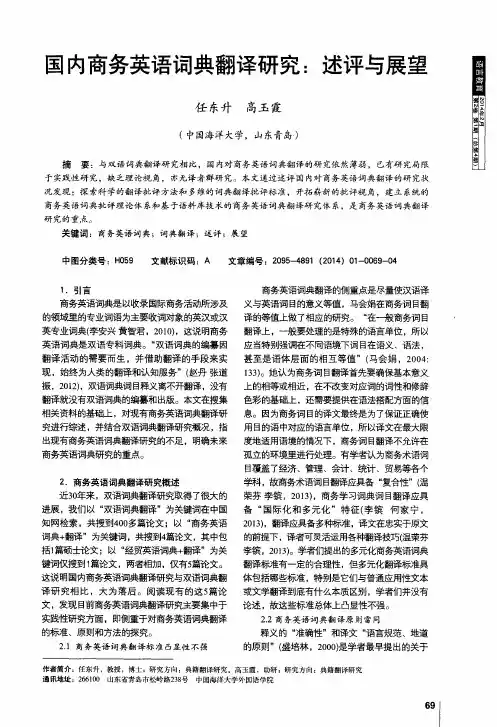
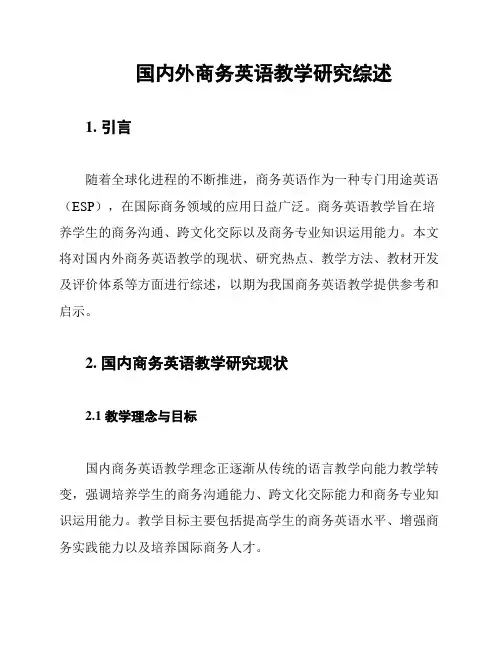
国内外商务英语教学研究综述1. 引言随着全球化进程的不断推进,商务英语作为一种专门用途英语(ESP),在国际商务领域的应用日益广泛。
商务英语教学旨在培养学生的商务沟通、跨文化交际以及商务专业知识运用能力。
本文将对国内外商务英语教学的现状、研究热点、教学方法、教材开发及评价体系等方面进行综述,以期为我国商务英语教学提供参考和启示。
2. 国内商务英语教学研究现状2.1 教学理念与目标国内商务英语教学理念正逐渐从传统的语言教学向能力教学转变,强调培养学生的商务沟通能力、跨文化交际能力和商务专业知识运用能力。
教学目标主要包括提高学生的商务英语水平、增强商务实践能力以及培养国际商务人才。
2.2 教学内容与课程设置国内商务英语教学内容主要包括商务英语听说、读写、翻译等基本技能,以及国际商务、市场营销、财务管理等相关知识。
课程设置方面,多数高校采用分模块教学,将商务英语课程与专业课程相结合,以满足不同专业学生的需求。
2.3 教学方法与手段国内商务英语教学方法以交际法、任务型教学法和案例教学法为主。
此外,随着信息技术的发展,多媒体、网络和仿真教学等现代教学手段在商务英语教学中得到广泛应用。
2.4 教材开发与评价体系国内商务英语教材种类繁多,但质量参差不齐。
近年来,教材开发逐渐注重实用性和实践性,以满足商务英语教学的需求。
评价体系方面,仍以终结性评价为主,的形成性评价和过程性评价尚未得到充分重视。
3. 国际商务英语教学研究现状3.1 教学理念与目标国际商务英语教学注重培养学生的跨文化商务沟通能力和全球视野。
教学目标主要包括提高学生的商务英语水平、增强商务实践能力以及培养具有国际竞争力的商务人才。
3.2 教学内容与课程设置国际商务英语教学内容涵盖了商务英语听说、读写、翻译等基本技能,以及国际商务、市场营销、财务管理等相关知识。
课程设置方面,国外高校普遍采用跨学科教学,将商务英语课程与专业课程相结合,以培养学生的综合商务能力。
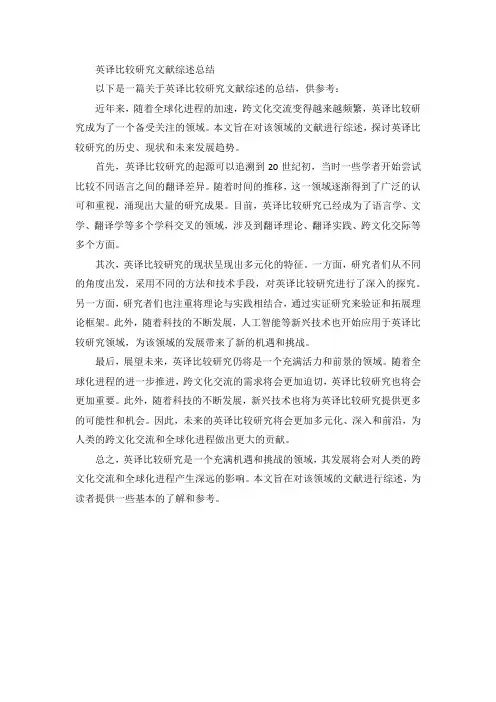
英译比较研究文献综述总结
以下是一篇关于英译比较研究文献综述的总结,供参考:
近年来,随着全球化进程的加速,跨文化交流变得越来越频繁,英译比较研究成为了一个备受关注的领域。
本文旨在对该领域的文献进行综述,探讨英译比较研究的历史、现状和未来发展趋势。
首先,英译比较研究的起源可以追溯到20世纪初,当时一些学者开始尝试比较不同语言之间的翻译差异。
随着时间的推移,这一领域逐渐得到了广泛的认可和重视,涌现出大量的研究成果。
目前,英译比较研究已经成为了语言学、文学、翻译学等多个学科交叉的领域,涉及到翻译理论、翻译实践、跨文化交际等多个方面。
其次,英译比较研究的现状呈现出多元化的特征。
一方面,研究者们从不同的角度出发,采用不同的方法和技术手段,对英译比较研究进行了深入的探究。
另一方面,研究者们也注重将理论与实践相结合,通过实证研究来验证和拓展理论框架。
此外,随着科技的不断发展,人工智能等新兴技术也开始应用于英译比较研究领域,为该领域的发展带来了新的机遇和挑战。
最后,展望未来,英译比较研究仍将是一个充满活力和前景的领域。
随着全球化进程的进一步推进,跨文化交流的需求将会更加迫切,英译比较研究也将会更加重要。
此外,随着科技的不断发展,新兴技术也将为英译比较研究提供更多的可能性和机会。
因此,未来的英译比较研究将会更加多元化、深入和前沿,为人类的跨文化交流和全球化进程做出更大的贡献。
总之,英译比较研究是一个充满机遇和挑战的领域,其发展将会对人类的跨文化交流和全球化进程产生深远的影响。
本文旨在对该领域的文献进行综述,为读者提供一些基本的了解和参考。

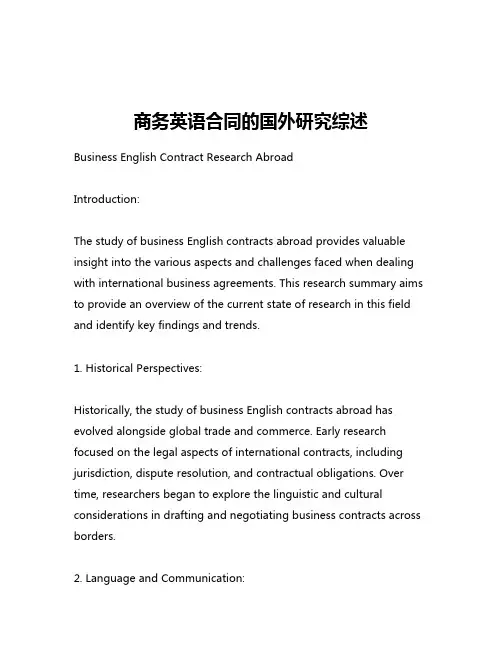
商务英语合同的国外研究综述Business English Contract Research AbroadIntroduction:The study of business English contracts abroad provides valuable insight into the various aspects and challenges faced when dealing with international business agreements. This research summary aims to provide an overview of the current state of research in this field and identify key findings and trends.1. Historical Perspectives:Historically, the study of business English contracts abroad has evolved alongside global trade and commerce. Early research focused on the legal aspects of international contracts, including jurisdiction, dispute resolution, and contractual obligations. Over time, researchers began to explore the linguistic and cultural considerations in drafting and negotiating business contracts across borders.2. Language and Communication:One important area of research is the role of language and communication in business contracts abroad. Scholars have examined the impact of language barriers, translation issues, and cross-cultural differences on the effectiveness and enforceability of contracts. The findings highlight the need for clear and unambiguous language, as well as the importance of employing professional translators or interpreters when necessary.3. Cultural Factors:Cultural factors play a significant role in international business contracts. Research has explored the influence of cultural norms, values, and practices on the negotiation and implementation of contracts. Understanding cultural nuances and adapting contract terms accordingly are crucial for building trust and fostering successful business relationships.4. Legal Frameworks:The legal frameworks governing business contracts vary across countries. Research has examined the different legal systems and their impact on contract interpretation, enforcement, and remedies in international business transactions. It emphasizes the importance of understanding and complying with the applicable laws andregulations to mitigate potential legal risks and ensure contract compliance.5. Contractual Terms and Clauses:Another area of study focuses on the specific contractual terms and clauses used in international business agreements. Researchers have examined common clauses such as force majeure, governing law, arbitration, and intellectual property rights. The findings underscore the need for careful drafting, considering the specific requirements and cultural contexts of each party involved.6. Technology and Digital Contracts:With the advent of digitalization, research has explored the impact of technology on international business contracts. Topics such as electronic signatures, online contracting, and data protection have gained prominence. Understanding the legal implications and ensuring secure and reliable digital transactions have become crucial in today's global business environment.7. Ethical Considerations:Ethics in business contracts abroad have also been a focal point of research. Scholars have examined ethical dilemmas, corruption, andbribery issues that can arise during contract negotiations. The findings underline the importance of ethical decision-making, transparency, and corporate social responsibility in international business practices.Conclusion:In conclusion, the study of business English contracts abroad encompasses various research areas such as language and communication, cultural factors, legal frameworks, contractual terms, technology, and ethics. This research summary provides an overview of the current state of research in this field and highlights the importance of understanding the complexities and challenges involved in international business agreements. By continuously expanding our knowledge in this area, businesses can navigate the intricacies of global trade more effectively and foster successful cross-border partnerships.。
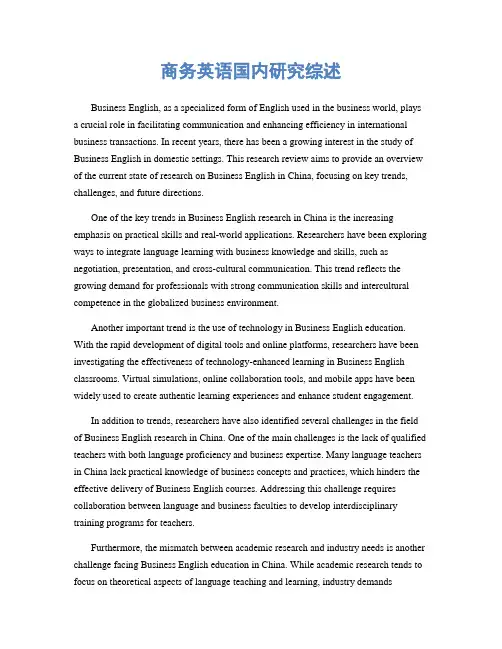
商务英语国内研究综述Business English, as a specialized form of English used in the business world, plays a crucial role in facilitating communication and enhancing efficiency in international business transactions. In recent years, there has been a growing interest in the study of Business English in domestic settings. This research review aims to provide an overview of the current state of research on Business English in China, focusing on key trends, challenges, and future directions.One of the key trends in Business English research in China is the increasing emphasis on practical skills and real-world applications. Researchers have been exploring ways to integrate language learning with business knowledge and skills, such as negotiation, presentation, and cross-cultural communication. This trend reflects the growing demand for professionals with strong communication skills and intercultural competence in the globalized business environment.Another important trend is the use of technology in Business English education. With the rapid development of digital tools and online platforms, researchers have been investigating the effectiveness of technology-enhanced learning in Business English classrooms. Virtual simulations, online collaboration tools, and mobile apps have been widely used to create authentic learning experiences and enhance student engagement.In addition to trends, researchers have also identified several challenges in the field of Business English research in China. One of the main challenges is the lack of qualified teachers with both language proficiency and business expertise. Many language teachers in China lack practical knowledge of business concepts and practices, which hinders the effective delivery of Business English courses. Addressing this challenge requires collaboration between language and business faculties to develop interdisciplinary training programs for teachers.Furthermore, the mismatch between academic research and industry needs is another challenge facing Business English education in China. While academic research tends to focus on theoretical aspects of language teaching and learning, industry demandspractical skills and competencies from graduates. Bridging this gap requires closer collaboration between academia and industry to ensure that Business English programs are aligned with the needs of the business world.Looking ahead, there are several promising directions for future research in Business English in China. One potential area is the integration of content-based instruction in Business English courses, which emphasizes the use of authentic business materials to teach language skills. This approach can help students develop both language proficiency and business knowledge simultaneously.Another promising direction is the exploration of innovative teaching methods, such as project-based learning and experiential learning. These methods can provide students with hands-on experience in applying language skills to real business scenarios, enhancing their communication and problem-solving abilities.In conclusion, the study of Business English in domestic settings in China is a dynamic and evolving field with a focus on practical skills, technology integration, and industry relevance. By addressing key trends, challenges, and future directions, researchers can contribute to the advancement of Business English education and prepare students for success in the global business environment.。
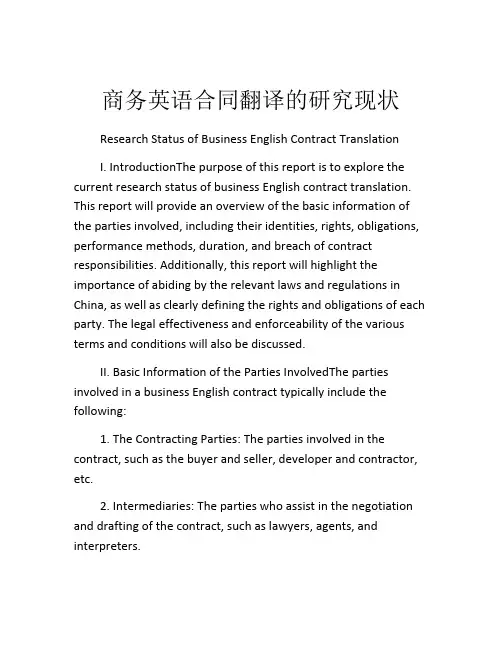
商务英语合同翻译的研究现状Research Status of Business English Contract TranslationI. IntroductionThe purpose of this report is to explore the current research status of business English contract translation. This report will provide an overview of the basic information of the parties involved, including their identities, rights, obligations, performance methods, duration, and breach of contract responsibilities. Additionally, this report will highlight the importance of abiding by the relevant laws and regulations in China, as well as clearly defining the rights and obligations of each party. The legal effectiveness and enforceability of the various terms and conditions will also be discussed.II. Basic Information of the Parties InvolvedThe parties involved in a business English contract typically include the following:1. The Contracting Parties: The parties involved in the contract, such as the buyer and seller, developer and contractor, etc.2. Intermediaries: The parties who assist in the negotiation and drafting of the contract, such as lawyers, agents, and interpreters.3. Other Stakeholders: The parties who have a direct interest in the contract, such as shareholders, investors, and creditors.III. Rights, Obligations, Performance Methods, Duration, and Breach of Contract ResponsibilitiesThe rights and obligations of the contracting parties should be clearly defined in the contract. This includes the following:1. Rights: The rights that each party have under the contract, such as the right to receive payment, the right to terminate the contract, etc.2. Obligations: The duties that each party must fulfill under the contract, such as the obligation to deliver goods, the obligation to pay, etc.3. Performance Methods: The methods that each party must use to fulfill their obligations under the contract, such as the delivery method, payment method, etc.4. Duration: The period of time during which the contract will be in effect, such as the start and end dates of the contract.5. Breach of Contract Responsibilities: The consequences of breaching the contract, such as the right to terminate the contract, the obligation to pay damages, etc.IV. Compliance with Relevant Laws and Regulations in ChinaAs China's legal system is constantly evolving, it is important to ensure that business English contracts comply with the latest legal requirements. This includes complying with laws andregulations concerning contracts, such as the Contract Law of the People's Republic of China.V. Legal Effectiveness and EnforceabilityTo ensure the legal effectiveness and enforceability of a business English contract, it is important to:1. Ensure that the contract is written clearly and precisely.2. Make sure that the parties involved understand the terms and conditions of the contract.3. Ensure that the contract is signed and dated by all parties.4. Ensure that the contract is in compliance with relevant laws and regulations in China.By following these steps, the legal effectiveness and enforceability of the contract can be maximized.VI. ConclusionIn summary, a business English contract should clearly define the basic information of the parties involved, their rights and obligations, performance methods, duration, and breach of contract responsibilities. It is also important that the contract complies with relevant laws and regulations in China, and that the contract is written clearly and precisely to ensure legal effectiveness and enforceability.。
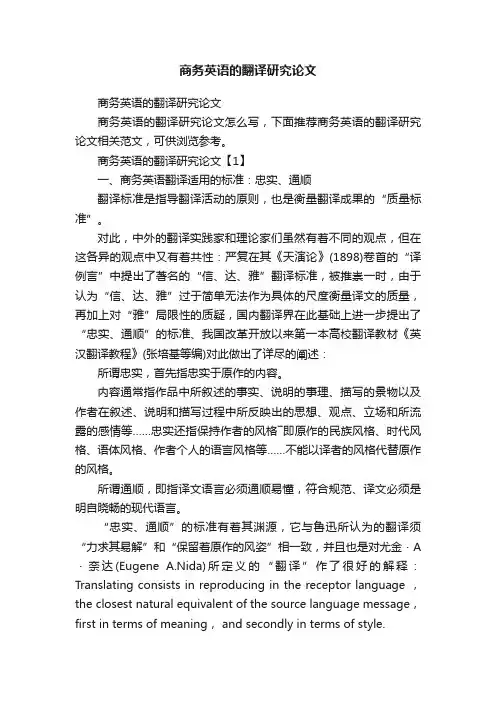
商务英语的翻译研究论文商务英语的翻译研究论文商务英语的翻译研究论文怎么写,下面推荐商务英语的翻译研究论文相关范文,可供浏览参考。
商务英语的翻译研究论文【1】一、商务英语翻译适用的标准:忠实、通顺翻译标准是指导翻译活动的原则,也是衡量翻译成果的“质量标准”。
对此,中外的翻译实践家和理论家们虽然有着不同的观点,但在这各异的观点中又有着共性:严复在其《天演论》(1898)卷首的“译例言”中提出了著名的“信、达、雅”翻译标准,被推崇一时,由于认为“信、达、雅”过于简单无法作为具体的尺度衡量译文的质量,再加上对“雅”局限性的质疑,国内翻译界在此基础上进一步提出了“忠实、通顺”的标准、我国改革开放以来第一本高校翻译教材《英汉翻译教程》(张培基等编)对此做出了详尽的阐述:所谓忠实,首先指忠实于原作的内容。
内容通常指作品中所叙述的事实、说明的事理、描写的景物以及作者在叙述、说明和描写过程中所反映出的思想、观点、立场和所流露的感情等……忠实还指保持作者的风格―即原作的民族风格、时代风格、语体风格、作者个人的语言风格等……不能以译者的风格代替原作的风格。
所谓通顺,即指译文语言必须通顺易懂,符合规范、译文必须是明自晓畅的现代语言。
“忠实、通顺”的标准有着其渊源,它与鲁迅所认为的翻译须“力求其易解”和“保留着原作的风姿”相一致,并且也是对尤金・A ・奈达(Eugene A.Nida)所定义的“翻译”作了很好的解释:Translating consists in reproducing in the receptor language ,the closest natural equivalent of the source language message,first in terms of meaning, and secondly in terms of style.商务英语的翻译,主要是给国际商务往来提供交流上的便利,提供足够并准确的信息、因此,“忠实、通顺”的标准对于商务英语的翻译显得尤为适用。
商务英语合同的国内外研究Research on Domestic and International Business English ContractsWith the increasing globalization of business, the useof business English contracts has become more common in both domestic and international business transactions. It is essential for businesses to understand the differences and similarities between domestic and international business English contracts in order to effectively communicate and negotiate with their partners.Domestic Business English ContractsIn the context of domestic business, English contracts are used to formalize agreements between parties within the same country. These contracts are governed by the laws and regulations of the specific country, and they may vary depending on the nature of the business and the parties involved. Domestic business English contracts are typically written in the official language of the country and may include specific legal terminology and clauses that are relevant to the local legal system.International Business English ContractsOn the other hand, international business English contracts are used to formalize agreements between parties from different countries. These contracts are more complex and require careful consideration of international laws, regulations, and cultural differences. International business English contracts often include provisions for dispute resolution, choice of law, and jurisdiction, aswell as specific clauses related to international trade, such as Incoterms and payment terms in different currencies.Differences between Domestic and International Business English ContractsOne of the main differences between domestic and international business English contracts is the legal framework within which they operate. Domestic contracts are governed by the laws and regulations of a single country, while international contracts must navigate the legal systems of multiple countries. This requires a deeper understanding of international laws and regulations, aswell as the ability to navigate potential conflicts between different legal systems.Another key difference is the level of complexity and detail in international business English contracts. Due to the cross-border nature of international transactions, these contracts must address a wide range of potential issues, including language barriers, currency exchange, cultural differences, and varying legal systems. As a result, international business English contracts are often longer and more detailed than their domestic counterparts.Similarities between Domestic and International Business English ContractsDespite these differences, there are also several similarities between domestic and international business English contracts. Both types of contracts serve the same fundamental purpose of formalizing agreements between parties, specifying the rights and obligations of each party, and providing a legal framework for dispute resolution. Additionally, both types of contracts require clear and precise language to ensure that all parties involved have a mutual understanding of the terms and conditions.ConclusionIn conclusion, the use of business English contracts is essential for both domestic and international business transactions. While there are significant differences between domestic and international contracts, such as the legal framework and level of complexity, there are also important similarities in terms of their fundamentalpurpose and the need for clear and precise language. Businesses that engage in domestic and international transactions must be aware of these differences and similarities in order to effectively negotiate and communicate with their partners.国内外商务英语合同的研究随着商业全球化的不断加深,商务英语合同在国内外的使用越来越普遍。
前沿视角研究年度发文量、发文期刊、关键词、突出术语等信息,对商务英语翻译教学进行可视化分析。
二、数据分析与图谱解读(一)年度发文量统计年度发文量的基本概况能大致反映相关研究的整体状况和发展趋势。
因此,将数据源中不同年份的发文数量进行了历时统计,得出了2003年至2022年国内商务英语翻译教学研究相关文献的发表数量曲线图(图1)。
从图1来看,国内商务英语翻译教学研究的发文量在各年度分布不均匀,上下波动幅度较大,但总体发文量呈上升趋势。
从2008年开始,相关文献的发表数量迅速增长,增长趋势一直保持到2018年并达到顶峰,这是因为自2007年教育部正式批准开设商务英语本科专业后,商务英语专业在各个高校蓬勃发展,商务英语翻译教学研究受到的关注日益增多。
2019年后,每年的发文数量呈下降趋势,但是对比2006年来看,依然是稳中有升,说明这一研究领域受到持续的关注。
图1国内商务英语翻译教学研究的历年发文量(2006—2022年)(二)高产期刊分布分析文献来源后发现,发文量大于等于3的期刊主要有11种(表1),其中《海外英语》《湖北开放职业学院学报》以及《英语广场》发文量最多,占比超过总量的40%。
然而纵观所有的发文期刊,未见有核心期刊,可见商务英语翻译教学研究领域虽然成果众多,然而缺乏高质量的论文。
因此,这一领域的研究还有待深挖。
(三)研究领域分布分析从表2可以看出,商务英语翻译教学的研究领域绝大部分聚焦于外国语言文字方面,这与研究主题词“翻译”高度契合。
因为与商务相关,所以与贸易经济领域相关性较高。
此外,因为主题词涉及教学,所以归属于教育领域的文章也不少。
此数据分析的结果表明,商务英语翻译教学研究与外国语言学、贸易经济、教育学等学科领域密切相关,且该研究具有跨学科的特质。
表1期刊发文量(发文数量≥3篇)期刊名称海外英语湖北开放职业学院学报英语广场中外企业家科教导刊才智教育教学论坛安徽工业大学学报林区教学对外经贸辽宁师专学报发文数量占比18.52%12.35%11.11%6.17%6.17%4.94%4.94%3.70%3.70%3.70%3.70%表2研究领域分布研究领域外国语言文字贸易经济教育理论与教育管理职业教育计算机软件及计算机应用高等教育文章数量203篇63篇15篇7篇6篇5篇(四)关键词共现分析关键词为整篇论文研究核心的概述,对论文的关键词开展研究,可对该研究的主题建立初步认知。
我国商务英语研究十年现状分析随着全球化的不断深入,商务英语在国际贸易中的作用日益凸显。
近年来,我国商务英语研究也取得了长足的发展。
本文将通过回顾我国商务英语研究的历史和现状,分析当前的研究现状,并预测未来的发展趋势,以期为相关领域的研究提供参考。
商务英语作为专门用途英语的一个重要分支,在我国的外语教学中有着举足轻重的地位。
自20世纪80年代起,随着对外开放的逐步深入,我国商务英语研究逐渐发展壮大,为培养国际化商务人才做出了重要贡献。
本文将重点过去十年我国商务英语研究的发展情况,并展望未来的研究方向。
20世纪80年代,随着对外经济贸易的不断发展,我国开始在高校设立商务英语专业。
90年代中期,商务英语研究逐渐成为学术界的焦点。
进入21世纪,特别是中国加入世界贸易组织后,商务英语研究得到了更广泛的应用和发展。
目前,我国商务英语研究已经形成了较为完整的教育体系,包括本科、硕士和博士研究生教育。
同时,相关学术期刊、学术会议和研究机构也为商务英语研究的深入发展提供了良好的平台。
研究领域:当前我国商务英语研究涵盖了多个领域,包括国际贸易、国际金融、国际营销等。
研究人员从不同角度对商务英语进行了深入探索,为实际应用提供了有力的理论支持。
研究方法:在过去十年中,我国商务英语研究采用了多种研究方法,包括实证研究、案例分析、文献综述等。
特别是实证研究方法在商务英语中的应用逐渐增多,为研究结果的可靠性提供了保障。
研究成果:近年来,我国商务英语研究成果丰富,许多研究都取得了实质性的进展。
如在国际贸易领域的研究中,商务英语在促进国际商务交流、提高贸易效率方面发挥了积极作用。
国际金融和国际营销等领域的研究也取得了不少成果。
热点领域:未来我国商务英语研究将更加新兴领域,如跨境电商、跨国公司管理等。
这些领域在全球化背景下具有较高的应用价值,为商务英语提供了新的研究视角。
研究方向:未来我国商务英语研究将更加注重跨文化交际能力的培养。
商务英语信函国内外研究现状**Abstract**This article delves into the current research status of business English correspondence both domestically and internationally. It highlights the varying approaches, methodologies, and cultural nuances that influence the language and tone employed in such correspondences. By comparing and contrasting these differences, the article aims to provide a comprehensive understanding of the evolving nature of business English correspondence and its importance in global communication.**I. Introduction**In the era of globalization, business English correspondence has emerged as a crucial aspect of cross-cultural communication. It serves as a bridge between organizations, facilitating the exchange of ideas, information, and agreements. Given its significance, the study of business English correspondence has attracted widespread attention from scholars and practitioners alike. This article explores the current research trends andperspectives in this field, focusing on both domestic and international perspectives.**II. Domestic Research Status**In China, the study of business English correspondence has been gaining momentum in recent years. Researchers have focused on analyzing the linguistic features, cultural implications, and practical applications of such correspondences. The emphasis is placed on the appropriateness, politeness, and clarity of language used, reflecting the importance of maintaining professionalism and etiquette in business communications.Moreover, there has been a growing interest in exploring the role of technology in shaping the format and content of business English correspondences. The advent of electronic communication tools like email and instant messaging has transformed the way businesses communicate, necessitating the adaptation of language and style to suit these new mediums.**III. International Research Status**Internationally, the study of business English correspondence is more diversified and interdisciplinary. Researchers draw from a wide range of fields, including linguistics, business communication, and cultural studies, to examine the nuances of business correspondences across different cultures and contexts.A key focus of international research is on the influence of cultural factors on the language and tone of business correspondences. Different cultures have distinct communication norms and expectations, which affect the way businesses communicate with each other. For instance, some cultures may prefer a more direct and concise style, while others may value a more indirect and polite approach. Understanding these cultural differences is crucial for effective cross-cultural business communication.**IV. Comparative Analysis**Comparing the domestic and international research statuses, it becomes evident that there are bothsimilarities and differences. Both approaches emphasize the importance of linguistic accuracy, clarity, and appropriateness in business English correspondences.However, the international perspective tends to be more diverse and interdisciplinary, drawing from a wider range of theoretical frameworks and methodologies.Moreover, the international research community places a stronger emphasis on the cultural dimensions of business communication. This reflects the increasing globalization of business and the need for organizations to adapt their communication strategies to suit different cultural contexts.**V. Challenges and Future Directions**Despite the progress made in the study of business English correspondence, several challenges remain. One major challenge is the rapidly evolving nature of business communication, which necessitates constant updating and refinement of research findings. Additionally, the increasing use of technology in business communication poses new challenges in terms of language adaptation and style.Future research in this field should focus on addressing these challenges and exploring new areas of inquiry. For instance, there is a need for more in-depthstudies on the impact of technology on business English correspondences, particularly in terms of language use and communication effectiveness. Moreover, there is scope for exploring the intersection of business English with other fields, such as marketing, human resources, and international relations, to provide a more comprehensive understanding of its role in modern business practices.**VI. Conclusion**In conclusion, the study of business English correspondence has undergone significant advancements both domestically and internationally. However, given the dynamic nature of business communication and the evolving technological landscape, there is a need for continued research and exploration in this field. By bridging the gap between cultural differences and understanding the nuances of business English correspondences, researchers can contribute to the development of more effective andefficient cross-cultural business communication strategies. **商务英语信函国内外研究现状****摘要**本文深入探讨了商务英语信函在国内外的研究现状,着重强调了不同方法、理论框架以及文化细微差别对信函语言和语气的影响。
商务英语国外研究综述English:In recent years, there has been a significant increase in research on Business English in foreign contexts. Scholars have explored various aspects of Business English, including its teaching methods, curriculum design, assessment techniques, and the integration of technology. One prominent area of research is the effectiveness of different pedagogical approaches in teaching Business English, with studies examining the efficacy of communicative, task-based, and content-based instruction. Additionally, researchers have investigated the role of cultural awareness in Business English teaching and learning, highlighting the importance of intercultural competence for successful communication in international business contexts. Moreover, there is a growing interest in the use of technology-enhanced learning tools and online platforms for Business English education, with studies examining the effectiveness of virtual simulations, online collaboration tools, and multimedia resources in enhancing language learning outcomes. Furthermore, research on Business English has also focused on the development of specialized language skills, such as negotiation, presentation, andemail writing, to meet the specific communication needs of professionals in various industries. Overall, the growing body of research on Business English in foreign contexts reflects the increasing recognition of the importance of English language proficiency for global business communication and the need for innovative approaches to teaching and learning in this field.中文翻译:近年来,国外商务英语研究呈现显著增长。
商务英语翻译国内外研究的综述
/h1
随着国际交流合作的扩大和经济贸易的高速发展,社会对“语言+专业”复合型人才的需求日益旺盛,商务英语作为ESP的重要分支,吸引了国内外众多学者进行研究。
一、国外研究综述
英美等国的应用语言学者在20世纪60年代就提出了关于“专门用途英语”或“特殊用途英语”(简称ESP)的教学理论。
1.ESP的理论研究。
理论研究主要回答商务英语作为专门用途英语(ESP)的语言本质、学科属性、文体特征等认识论层面的问题。
例如,Strevens指出:在内容和目标有特定学习群体的特殊需要时,ESP不仅包含英语语言技能的训练,而且有明显的专业内涵,是语言技能训练与专业知识的结合。
Barber、Tarone和Lackstrom等学者从文体学、句法学、语用学、体裁分析等角度研究了商务英语的词汇特点、语言特征和文体特征,通过分析语言的宏观结构和实现这些结构的微观语法词汇模式,来研究商务英语翻译的认知结构和建构策略,探索特定商务交际情境下的语言学习。
2.ESP的应用研究。
应用研究主要解决与专门用途英语教学有关的系列问题,如教学大纲的制定、课程设置、教材编写、语言技能的培训、测量和评估以及教学方法等。
例如,Dudley
主张在专门用途英语教学中以任务为主,以应用为核心的教学途径,即“为用而学,用中学,学中用”。
它为学生提供了较大的实践空间,能较好地发挥学生的主动性和创造性。
Douglas指出,特殊目的语言能力由语言知识(语法知识、语篇知识、功能知识和社会语言学知识),策略能力和背景知识(话语领域)构成,因此商务英语翻译能力的培养应从语言知识、策略能力和商务背景知识三方面着手。
二、国内研究综述
国内商务英语翻译教学研究从2010年起开始蓬勃发展,并逐渐呈现上升趋势。
具体研究现状如下:
1.研究主题类型。
商务英语翻译教学研究大体分为五类,一是进行理论剖析,即分析语言学理论尤其是翻译学理论对商务英语翻译教学的指导意义,如建构主义、功能目的理论等指导下的商务英语翻译教学;二是研究教学模式,即探讨当今流行的一些教学模式或教学方法在商务英语翻译课堂中的运用,如任务型教学法、项目教学法、小组合作法、案例分析法等;三是研究现状、提出对策,即描述当前商务英语翻译教学的现状(如学生基础较差、教材陈旧、师资力量不足等),并提出相应的解决对策;四是研究翻译实训教学,即关注校企合作,面向市场或区域经济的商务英语翻译教学;五是关注网络多媒体和语料库在商务英语翻译教学中的运用。
2.研究方法。
国内对商务英语翻译教学的研究方法以定性研究为主,如对教学经验的总结、对课堂教学的设置等,而定量研究较少。
鉴于定量研究和定性研究各有其优缺点,可以实
现不同的研究目的,广东外语外贸大学的桂诗春教授指出:“应用语言学必须和其他自然科学一样,采用科学的方法、现代化的统计和测量手段进行量化分析,以系统数据为基础的定量研究应引起商务英语翻译研究者的关注和运用。
”
3.研究趋势。
随着商务英语翻译教学研究的发展,其研究方法正逐渐呈现跨学科的特点,即运用测量学、心理语言学、社会语言学、应用语言学、语言习得等学科的新发展来指导商务英语翻译教学的研究。
二是对市场需求及学习主体的研究,如影响学生翻译能力习得等因素,在商务英语翻译教学研究中的作用逐渐得到重视。
三是计算机辅助教学,如语料库、机器翻译等在商务英语翻译教学中的运用将会得到加强。
例如,北京外国语大学的王克非教授论证了语料库翻译学的范式理据与体系,深化了语料库翻译学的应用研究;对外经济贸易大学的王立非教授提出了建设基于CBI理论的机辅商务翻译教学平台等。
以上研究为商务英语翻译作为专门用途英语教学的研究奠定了良好的基础,为我国商务英语翻译培养既具有扎实的英语专业知识,又通晓特定行业基础知
/h1
识的复合型人才的培养目标提供了理论依据,为商务英语翻译教学的研究与实践拓宽了新思路,具有重要的指导意义。